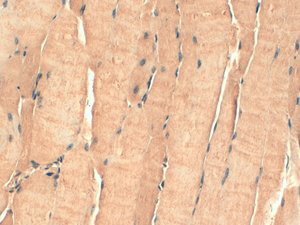Datasheet is currently unavailable. Try again or CONTACT US
Tsp23 Antibody
Mouse Monoclonal Tsp232A IgG1 kappa
209-301-G60
100 µg
Liquid (sterile filtered)
WB, IHC
Human
Mouse
This product is discontinued
Product Details
Anti-TSP23 (MOUSE) Monoclonal Antibody - 209-301-G60
mouse anti-Tsp23 antibody, mouse anti-Transcript similar p23 antibody, alanyl-tRNA synthetase domain containing 1, prostaglandin E synthase 3, Hsp90 Co-Chaperone P23, Unactive Progesterone Receptor 23 KD, Cytosolic Prostaglandin E Synthase
Mouse
Monoclonal
IgG1
Target Details
PTGES3L - View All PTGES3L Products
Human
Recombinant Protein
Tsp23 Antibody was produced in mice by repeated immunizations raised against recombinant tsp23.
Anti-Tsp23 Antibody was purified by Protein G chromatography. This monoclonal antibody is specific for human Tsp23 protein. A BLAST analysis was used to suggest cross-reactivity with Tsp23 from human based on 100% homology with the immunizing sequence. Detects Tsp23, no cross-reactivity to p23. Cross-reactivity with Tsp23 from other sources has not been determined. Heat Shock research.
B9A003 - UniProtKB
NP_001136126.1 - NCBI Protein
Application Details
IHC, WB
Anti-Tsp23 Antibody is tested for use in WB and IHC. Expect a band approximately ~19kDa corresponding to specific lysates. Specific conditions for reactivity should be optimized by the end user.
Formulation
1mg/mL by UV absorbance at 280 nm
0.02 M Potassium Phosphate, 0.15 M Sodium Chloride, pH 7.2
50% (v/v) Glycerol
Shipping & Handling
Dry Ice
Store vial at -20° C prior to opening. Aliquot contents and freeze at -20° C or below for extended storage. Avoid cycles of freezing and thawing. Centrifuge product if not completely clear after standing at room temperature. This product is stable for several weeks at 4° C as an undiluted liquid. Dilute only prior to immediate use.
Expiration date is one (1) year from date of receipt.
p23 is a highly conserved ubiquitous protein, known to have an important function as a cochaperone for the hsp90 chaperoning system. Studies have revealed that p23 is a small protein (18 to 25 kDa) with a simple structure. p23 is a phosphor-protein, which is highly acidic and has an aspartic acid-rich c-terminal domain. Numerous studies have found p23 to be associated with other client proteins like Fes tyrosine kinase, the heme regulated kinase HRI, hsf1 transcription factor, aryl hydrocarbon receptor, telomerase, and Hepadnavirus reverse transcriptase. In spite of several years of study, the exact functional significance of p23 is still not clear. p23 is thought to be involved in the adenosine triphosphate–mediated hsp90 binding of client proteins. Since many hsp90 client proteins are involved in oncogenic survival signaling, a recent study has concluded p23 to be a promising target in leukemic apoptosis. Hsp90 and its co-chaperone p23 are certainly among the emerging anti-tumor targets in oncology. Specifically TSP23 (transcript similar p23) displays 44% and 17% amino acid identity with p23 and Sba1p respectively.
This product is for research use only and is not intended for therapeutic or diagnostic applications. Please contact a technical service representative for more information. All products of animal origin manufactured by Rockland Immunochemicals are derived from starting materials of North American origin. Collection was performed in United States Department of Agriculture (USDA) inspected facilities and all materials have been inspected and certified to be free of disease and suitable for exportation. All properties listed are typical characteristics and are not specifications. All suggestions and data are offered in good faith but without guarantee as conditions and methods of use of our products are beyond our control. All claims must be made within 30 days following the date of delivery. The prospective user must determine the suitability of our materials before adopting them on a commercial scale. Suggested uses of our products are not recommendations to use our products in violation of any patent or as a license under any patent of Rockland Immunochemicals, Inc. If you require a commercial license to use this material and do not have one, then return this material, unopened to: Rockland Inc., P.O. BOX 5199, Limerick, Pennsylvania, USA.


